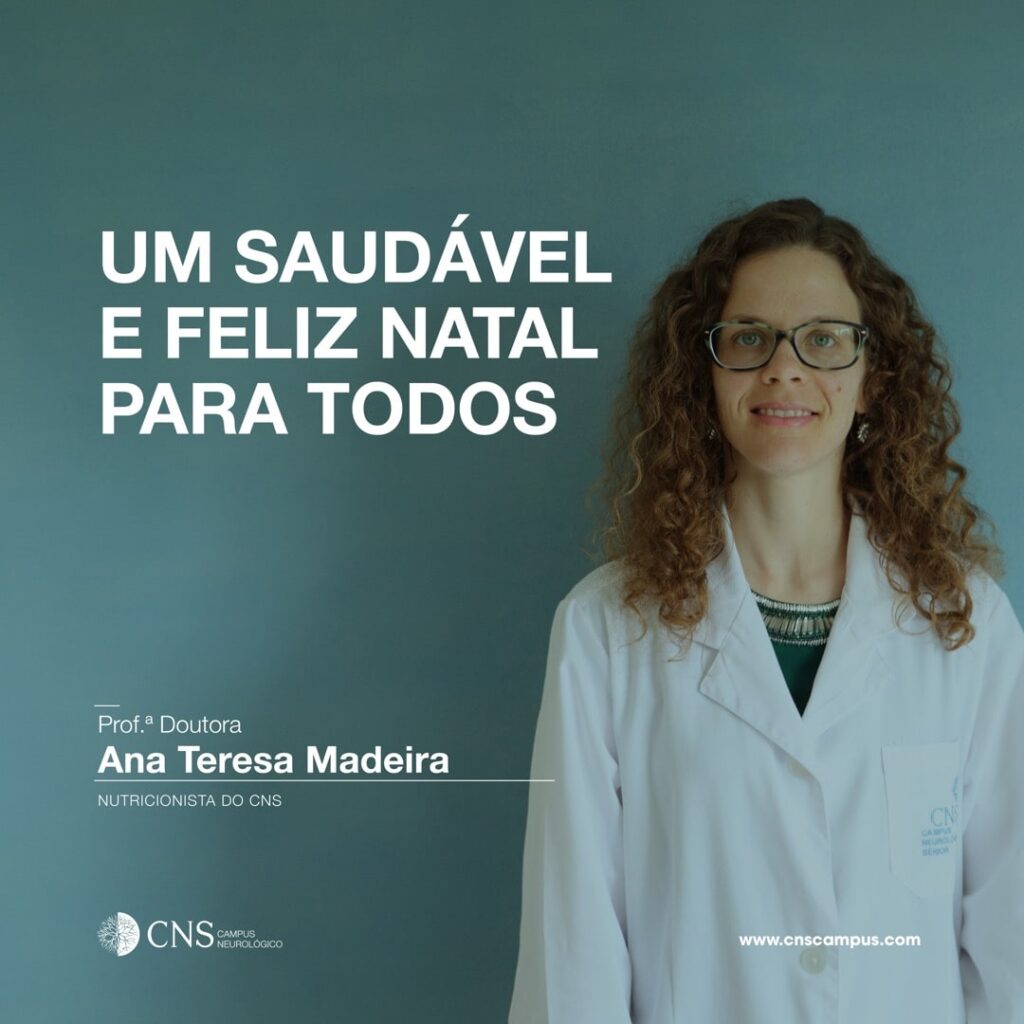The festive season is approaching, which emphasizes the need to establish nutritional care. In this context, we share an interview with Professor Doctor Ana Teresa Madeira, a nutritionist at CNS – Campus Neurológico, where she explained strategies for a healthy diet during Christmas, paying special attention to cases of swallowing alterations (dysphagia).
What are the most common myths surrounding food during the festive season?
Professor Doctor Ana Teresa Madeira (ATM) – A thought that can make life difficult at this time of year is thinking that if you’re lost for 100, you’re lost for 1000. This mindset leads us not to be moderate in exceptions, whether on feast days or throughout the entire month of December. Another associated myth is that a Christmas bread, even if small, or even a dream (a type of pastry), doesn’t have many calories, but unfortunately, that’s not the case. A small bread can have the sugar equivalent to what we have in two sugar packets added to coffee.
In your opinion, what are the main challenges faced when trying to maintain a balanced diet during the festivities?
ATM – I think one of the first challenges is the availability of less healthy foods throughout the month, be it at work, during Christmas lunches and dinners, at our home, or at the places we visit, where chocolates and other sweets remain on the table, easily accessible for several days. If food exceptions were limited to the 24th/25th and 31st/1st, the negative effects would probably be minimal. Another challenge, which can also be an opportunity for people with reduced appetite, is that we tend to eat more when in groups, and during these days, we spend a lot of time at the table. The large amount of sugar and saturated fat in festive desserts can also be a challenge to maintaining a proper diet during this time.
How can we balance gastronomic tradition with healthier food choices? What ingredients or preparation methods can be modified to make dishes more nutritious yet equally appealing?
ATM – Many dishes we consume at this time, which are part of our tradition, have very healthy ingredients, which are even included in the Mediterranean diet wheel, such as potatoes, chestnuts, onions, garlic, dark green leafy vegetables, carrots, tomatoes, pomegranate, olive oil, nuts like hazelnuts and almonds, but also meat and fish, especially octopus and cod. The key issue is quantity. On average, the Portuguese population consumes too much meat/fish and too little fruit and vegetables. In addition to quantity, cooking methods are also relevant. It’s healthier to bake French toast instead of frying in oil, to eat boiled or baked potatoes instead of fried ones, to leave the sauce in the baking dish, or to make the traditional Portuguese Christmas cake at home. I would like to emphasize that for older people, challenges can be the opposite, meaning insufficient intake and reduced appetite even with full tables.
What dietary precautions do you suggest to ensure a safe and pleasant experience for people with swallowing alterations (dysphagia)? Are there dishes or recipes that can be adapted for this condition?
ATM – There are different types and levels of dysphagia. It’s essential to have a diagnosis by specialized health professionals and specific intervention for each person. Generalizing can be dangerous, but some foods that are common during this season can be risky for many people with dysphagia, such as hard and small foods like hazelnuts, powdered spices like cinnamon, chicken soup due to its dual consistency, and cod with cream if the potatoes and onion slices are large and the consistency isn’t creamy and homogeneous. Almost all recipes can be adapted to be safe for people with dysphagia. There are some free resources and e-books that can help. It’s crucial that Christmas dishes are adapted for people with dysphagia and that risky foods are not easily accessible or prominently displayed.
What other practices or habits can contribute to a healthy and balanced lifestyle during this season?
ATM – Besides the dietary issues I mentioned, highlighting moderation in quantities, it’s useful to remember that we should stay active during this season. It might be more challenging because we are busier, the days are shorter or colder, but it’s essential to maintain physical activity daily, whether it’s in kitchen tasks, preparing the house, shopping on foot, or even playing games or walking as a family. Lastly, I’d like to mention that the famous Mediterranean diet pattern, associated with better health outcomes, also includes conviviality at the table, which we shouldn’t lose.
If you could highlight a single piece of advice for a healthier Christmas, what would it be?
ATM – May it be a time of happy moments and good memories, but may it also be safe. Some risks aren’t worth taking, whether they have immediate severe consequences, like the risk of aspiration for those with dysphagia, or those that have medium to long-term consequences because they accumulate over “several Christmases” and can greatly reduce our quality of life.
